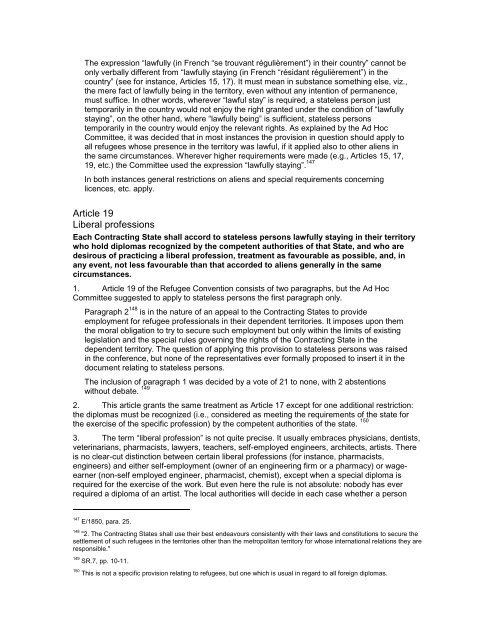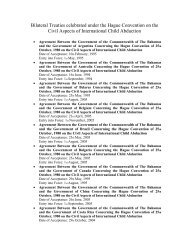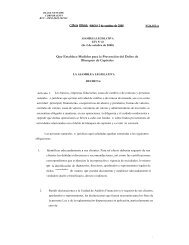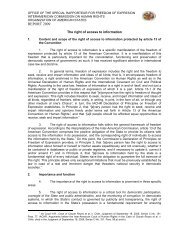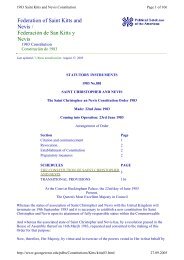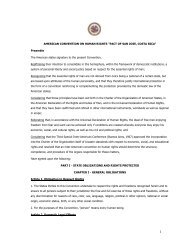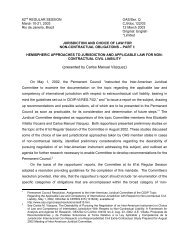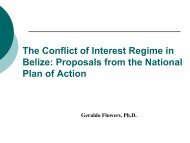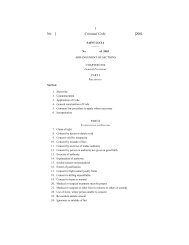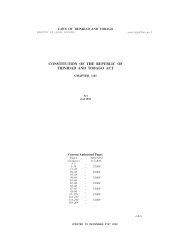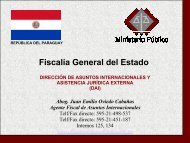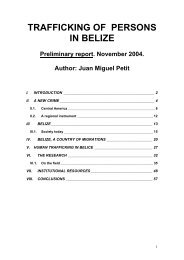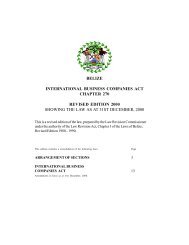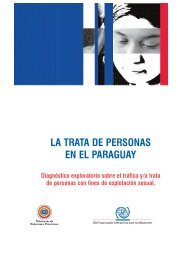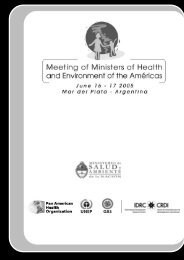CONVENTION RELATING TO THE STATUS OF ... - Refworld
CONVENTION RELATING TO THE STATUS OF ... - Refworld
CONVENTION RELATING TO THE STATUS OF ... - Refworld
You also want an ePaper? Increase the reach of your titles
YUMPU automatically turns print PDFs into web optimized ePapers that Google loves.
The expression “lawfully (in French “se trouvant régulièrement”) in their country” cannot be<br />
only verbally different from “lawfully staying (in French “résidant régulièrement”) in the<br />
country” (see for instance, Articles 15, 17). It must mean in substance something else, viz.,<br />
the mere fact of lawfully being in the territory, even without any intention of permanence,<br />
must suffice. In other words, wherever “lawful stay” is required, a stateless person just<br />
temporarily in the country would not enjoy the right granted under the condition of “lawfully<br />
staying”, on the other hand, where “lawfully being” is sufficient, stateless persons<br />
temporarily in the country would enjoy the relevant rights. As explained by the Ad Hoc<br />
Committee, it was decided that in most instances the provision in question should apply to<br />
all refugees whose presence in the territory was lawful, if it applied also to other aliens in<br />
the same circumstances. Wherever higher requirements were made (e.g., Articles 15, 17,<br />
19, etc.) the Committee used the expression “lawfully staying”. 147<br />
In both instances general restrictions on aliens and special requirements concerning<br />
licences, etc. apply.<br />
Article 19<br />
Liberal professions<br />
Each Contracting State shall accord to stateless persons lawfully staying in their territory<br />
who hold diplomas recognized by the competent authorities of that State, and who are<br />
desirous of practicing a liberal profession, treatment as favourable as possible, and, in<br />
any event, not less favourable than that accorded to aliens generally in the same<br />
circumstances.<br />
1. Article 19 of the Refugee Convention consists of two paragraphs, but the Ad Hoc<br />
Committee suggested to apply to stateless persons the first paragraph only.<br />
Paragraph 2 148 is in the nature of an appeal to the Contracting States to provide<br />
employment for refugee professionals in their dependent territories. It imposes upon them<br />
the moral obligation to try to secure such employment but only within the limits of existing<br />
legislation and the special rules governing the rights of the Contracting State in the<br />
dependent territory. The question of applying this provision to stateless persons was raised<br />
in the conference, but none of the representatives ever formally proposed to insert it in the<br />
document relating to stateless persons.<br />
The inclusion of paragraph 1 was decided by a vote of 21 to none, with 2 abstentions<br />
without debate. 149<br />
2. This article grants the same treatment as Article 17 except for one additional restriction:<br />
the diplomas must be recognized (i.e., considered as meeting the requirements of the state for<br />
the exercise of the specific profession) by the competent authorities of the state. 150<br />
3. The term “liberal profession” is not quite precise. It usually embraces physicians, dentists,<br />
veterinarians, pharmacists, lawyers, teachers, self-employed engineers, architects, artists. There<br />
is no clear-cut distinction between certain liberal professions (for instance, pharmacists,<br />
engineers) and either self-employment (owner of an engineering firm or a pharmacy) or wageearner<br />
(non-self employed engineer, pharmacist, chemist), except when a special diploma is<br />
required for the exercise of the work. But even here the rule is not absolute: nobody has ever<br />
required a diploma of an artist. The local authorities will decide in each case whether a person<br />
147 E/1850, para. 25.<br />
148 "2. The Contracting States shall use their best endeavours consistently with their laws and constitutions to secure the<br />
settlement of such refugees in the territories other than the metropolitan territory for whose international relations they are<br />
responsible."<br />
149 SR.7, pp. 10-11.<br />
150 This is not a specific provision relating to refugees, but one which is usual in regard to all foreign diplomas.


